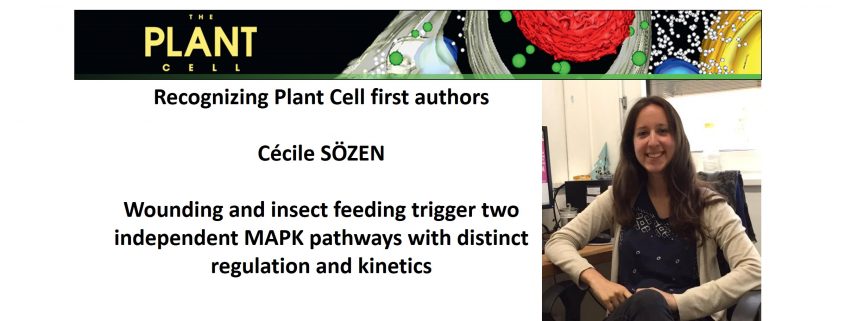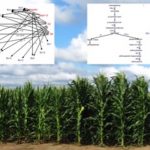Recognizing Plant Cell authors: Cécile SÖZEN
Cécile SÖZEN, first author of Wounding and insect feeding trigger two independent MAPK pathways with distinct regulation and kinetics
Current Position: Currently unemployed, looking for a postdoc position in Plant or Marine biology in Maine (USA)
Education: PhD in the “Stress signaling” group led by Dr. Jean Colcombet at the Institute of Plant Sciences of Paris-Saclay (IPS2). M.Sc. and B.Sc. in Plant Physiology and Life Sciences at Université Pierre & Marie Curie (Sorbonne Universités – UPMC) in Paris, FRANCE
Non-scientific Interests: literature and cinema, writing, travelling, hiking, Asian food and culture
Brief bio: I discovered Plant Biology during my B.Sc. and immediately developed an interest for this field of study. I was especially intrigued and impressed by signaling mechanisms taking place in plant cells and their ability to respond efficiently to environmental stimuli. At this time I was especially interested in the effect of drought on crops as it is a major concern in developing countries. Following my instincts I had my first lab experience in the “Molecular Physiology of Plant Desiccation Tolerance” team (Pr. Jill Farrant) at the University of Cape Town (UCT- South Africa). During my short stay there I helped isolating the homolog of a gene involved in vitamin C biosynthesis in a resurrection plant mainly using molecular biology methods. During my M.Sc. I had the chance to do a 6-month internship in the “Aquaporins” team (Dr. Christophe Maurel) at the Plant Biochemistry & Molecular Physiology Institute (BP&MP- Montpellier, France). I studied the role of an aquaporin in the signaling of the major drought hormone ABA in Arabidopsis thaliana. This experience helped me develop new skills and confirmed my will to pursue my career in research on plants. Finally, during my PhD, I worked on the characterization of a MAPK-dependent signaling pathway in a context of wounding and herbivory which are also important threats to crops and plants in general. We were able to identify two independent MAPK modules activated by wounding, one of them being under hormonal control (Jasmonic Acid). We also demonstrated the role of the latter in resistance towards caterpillar feeding. The main results of my PhD work are presented in this paper. I recently moved to Brunswick, ME (USA) and am looking for a postdoc position in the area. I am willing to develop new skills and maybe work on a different plant model. I am also interested in moving to the Marine Biology field and studying climate change effects on marine life.




